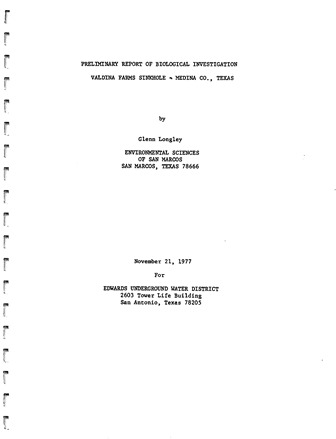Preliminary Report of Biological Investigation – Valdina Farms Sinkhole-Medina Co., Texas

| Summary |
|
Valdina Farms Sinkhole occurs on the recharge zone of the Edwards Aquifer in Northwest Medina County. …Geologists of the U.S. Geological Survey have observed large quantities of water entering the sinkhole during floods. The Edwards Underground Water District proposes to construct a dam on Seco Creek with a diversion channel that would direct additional water into Valdina Farms Sinkhole. The U.S. Geological Survey estimates that the proposed construction would add an average of 1400 acre feet of water to the aquifer each year. This flow would otherwise leave the recharge zone. The diversion channel is to be constructed in a manner such that boulders, large rocks and other large debris will not enter the cave. … [Dr. Longley was tasked with surveying the sinkhole and cave, and determining whether or not the proposed dam and diversion channel would adversely affect the fauna living there.] In summary, the following main conclusions have been derived from this study: 1) The project will not cause the extinction of Eurycea troglodytes (Valdina Farms Salamander). 2) There is considerable doubt that the salamander is a distinct species, but instead is a form of Eurycea neotenes (Edwards Plateau Spring Salamander) • 3) The cave will not plug up as a result of the proposed project. 4) The additional recharge that will include some non-toxic organic matter will stimulate the subterranean ecosystem. 5) The recharge will be of considerable benefit to the aquifer which is having ever increasing demands placed on it by pumping. 6) This will likely benefit organisms in springs fed by the aquifer due to prolonged flow. 7) This site is one of the best possible choices for additional recharge due to the low population density in the watershed above the site. Due to its location this area will not be heavily populated in the foreseeable future. 8) Any risk to terrestrial forms in the cave is far outweighed by the benefits to organisms in other areas (this includes man). 9) Pesticide use in the area above the watershed should be maintained at present levels which apparently are minimal. 10) Persons involved in the evaluation of this project should look at the overall benefits and weigh them against the potential costs environmentally. |
Search for Documents
Advance Search
Explore EAA's Scientific Reports
- All Reports
- Surface Water / Groundwater Relationship
- Biology
- Springs, Groundwater Discharge
- Archaeology
- RZ Protection
- Aquifer Levels
- Remote Sensing
- Precipitation
- Overview Studies
- Modeling
- Hydrology and Hydrogeology
- History
- Groundwater Recharge, Recharge Zone
- Groundwater Movement
- Geomorphology and Caves
- Weather Modification
- Geology
- Water Use and Conservation
- Geochemistry
- Water Resources Planning and Management
- Floods and Drought
- Water Quality
- Climatology
